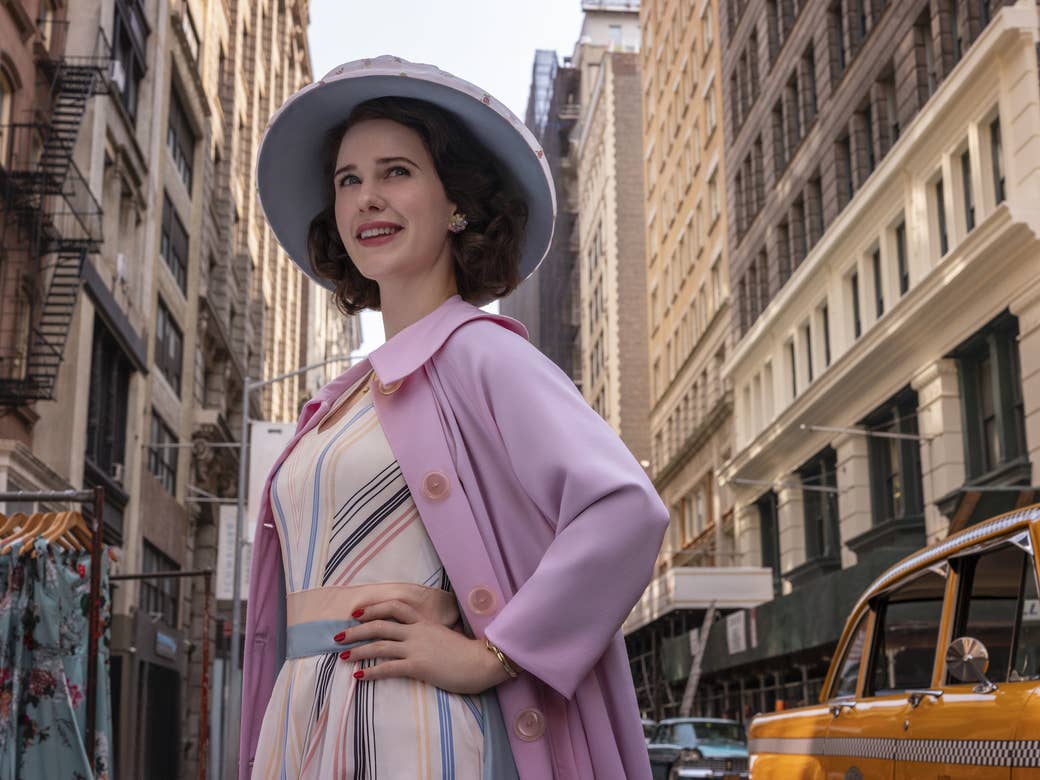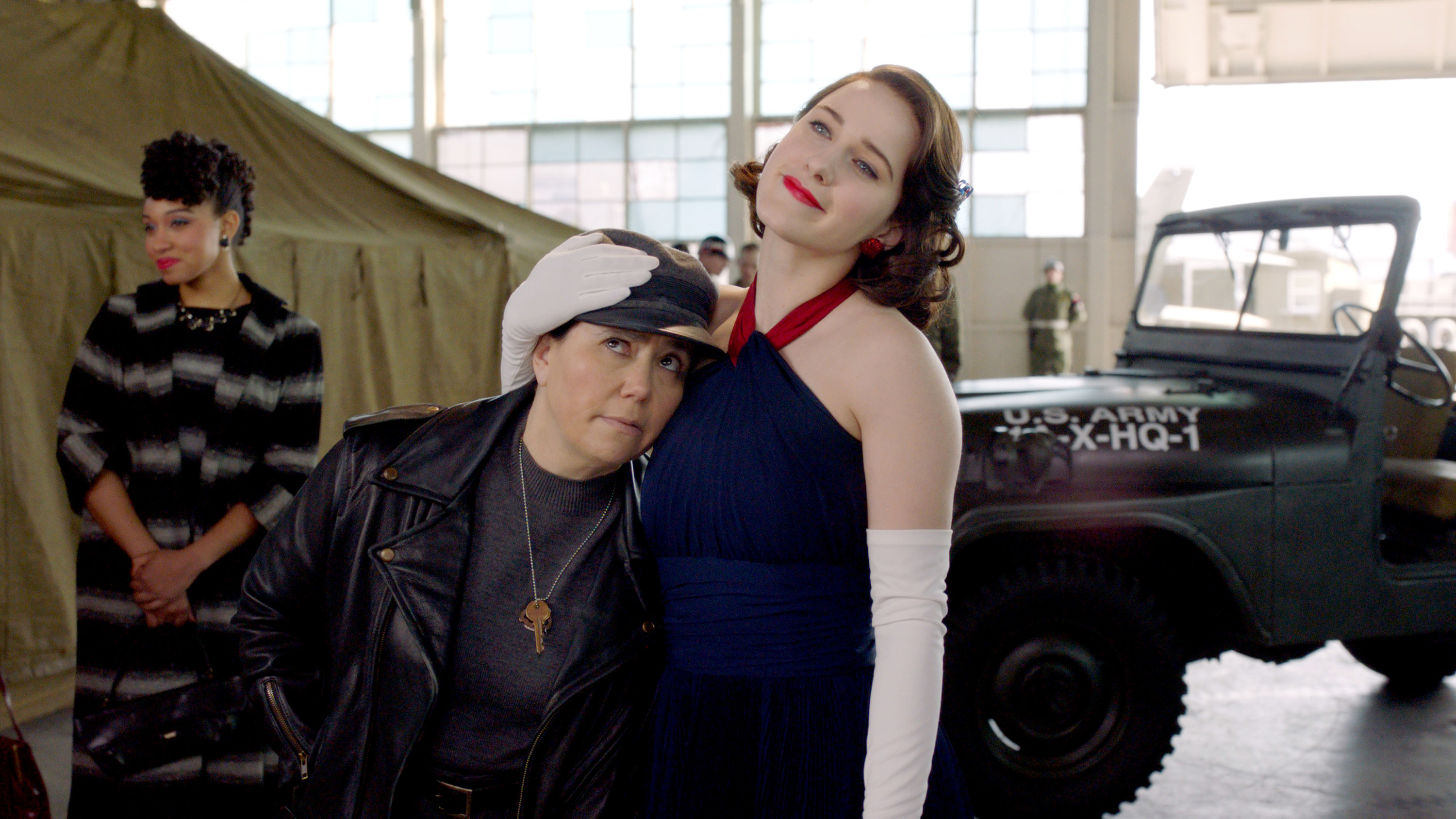
In the third season of Amazon’s The Marvelous Mrs. Maisel, the titular character played by Rachel Brosnahan continues to blaze trails. As one of the few women comedians climbing the ladder of success in 1960, “Midge” Maisel goes on tour, leaving her children at home in New York City to be cared for by her ex, Joel (Michael Zegen). Onstage, she’s foul-mouthed and tells sex jokes, even as she continues to wear a traditional pearl necklace.
Of course, none of this was commonplace in a time when women were expected to be primary caregivers for their children and fulfill traditional gender roles. But according to Brosnahan, her character, like the others on the show, isn’t necessarily trying to be revolutionary. She doesn’t think of herself as a pioneer for equality or women’s rights — she’s just trying to live her life on her own terms. “I don't think that they're necessarily aware of the extent to which they are challenging the norm,” Brosnahan told BuzzFeed News. “They know it's different and they know it’s not how things are supposed to go, but it's just what happens to be right for them.”
This third season of Maisel, which debuted on Dec. 6 to mixed reviews from critics, is set in 1960, some two years after the show’s first season. As the characters move into one of the most turbulent decades of US social change, many continue to find themselves acting progressively or chafing against the status quo — albeit somewhat inadvertently. But in this, the show also demonstrates how the broader social movements of the 1960s began at the personal level. “I'd love to think that they were fighting on behalf of women and men and shaking up gender roles everywhere,” said Brosnahan, “but in reality I think they're just fighting for themselves and what's right for them in that moment.”

This quiet revolution is most clear in the evolving and unusual relationship between Midge and Joel. In the season’s second episode as they finalize their divorce at a court hearing, the presiding judge expresses shock at Joel’s presence in the courtroom for “moral support.” The couple’s relationship is “undergoing a huge shift” this season, per Brosnahan, with the two working on creating something that was unique in the early 1960s.
But this change also involves Joel developing more awareness of the gender confines under which Midge is operating. “Joel sees firsthand how many people are telling her that she can't do it, or telling her that it's not acceptable for her to be doing what she's doing and how she's doing it,” Brosnahan said. “Joel is maybe for the first time seeing what that kind of sexism looks like in real life and he sticks up for Midge, and he doesn't like it either.”
Midge is also still learning about what life looks like beyond the privilege of the Upper West Side. While Maisel has been criticized for its portrayal of race, specifically for its overwhelmingly white fictional world, this season of the show leans into Midge’s racial obliviousness more overtly. In one episode, she’s surprised to learn that the black musicians on her tour can’t stay at the same hotel as her in Florida. In another, she’s nervous to open at the famous Apollo Theater in Harlem because she doesn't realize until right before she takes the stage that her usual material might not appeal to the all-black crowd. But these moments serve as learning opportunities for Midge, planting seeds for bigger change in her worldview.
"I love Midge so much but sometimes I want to smack her upside the head because she doesn't always listen as well as I'd like her to or grow as fast as I want her to," Brosnahan said. "But I do appreciate that this season forces Midge to confront the idea that she's not the center of everyone's universe all the time. That leads to a lot of growth and surely there will be more steps backwards before she continues to go forward."
Like Midge, her manager Susie Myerson (Alex Borstein) doesn’t give much thought to how her actions are paving the way for a more progressive future. For Borstein, Susie is mostly oblivious to the constructs around her. She simply wants to make a change in her own life and put food on her table. “It's still a rougher road being a woman, but I think she's kind of unaware,” Borstein told BuzzFeed News. “Does she even have a consciousness about being a woman? Does Susie even know what her boundaries should be or are supposed to look like? I’m not sure she does.”

While Borstein has said Susie’s sexuality remains a mystery even to Susie, her character looks and acts differently from other women on the show. She wears leather jackets and suspenders rather than A-line dresses, and sports a black-and-white palette that stands in stark contrast to the bright, saturated colors on the show. But Borstein says the masculinity in her character comes from within and isn’t about acting out against something bigger.
“Her being brusk and having the physical appearance that she has probably helps her,” Borstein said. “I think if she looked more like Imogene Cleary [Midge’s friend, played by Bailey De Young] and was a sweet little tiny thing in the ’50s, I don't think she'd be as effective and it'd be harder for her to push her way into a lawyer's office and try to even be taken remotely seriously. I think in that regard, she's got a leg up.”
Supporting characters in Midge’s orbit, like her parents, Rose (Marin Hinkle) and Abe Weissman (Tony Shalhoub), are also evolving slowly with the decade in this new season. Abe quits his job as a Columbia University professor and becomes a political activist, while Rose turns down much-needed money from her sexist family. Crucially, as Rose realizes, it’s Midge’s actions and self-determination which were sparked the first season that are still affecting those around her.
"What's going on with you two?" Midge asks her parents in one episode.
"You are what's going on with us!" Rose tells her daughter. "I was very happy being me, I didn't need to be equal or stand up for myself. I was fine. I've gone my entire life with other people making all my decisions and I loved it. You — you put this in my head, you made me passionate and independent and broke."
Brosnahan said this change in others is because Midge’s personal decisions have impacted those around her on deeper levels than they understand. “I think she's forcing everyone to look at their own lives because she blew everyone's up including her own,” Brosnahan said. “And they're going to have to change and adapt to meet her where she’s at.”
Midge’s actions may not originally have been intended as groundbreaking, but they’ve long since rippled out. As the show readies itself for a fourth season, moving further into the 1960s, prepare for waves.
